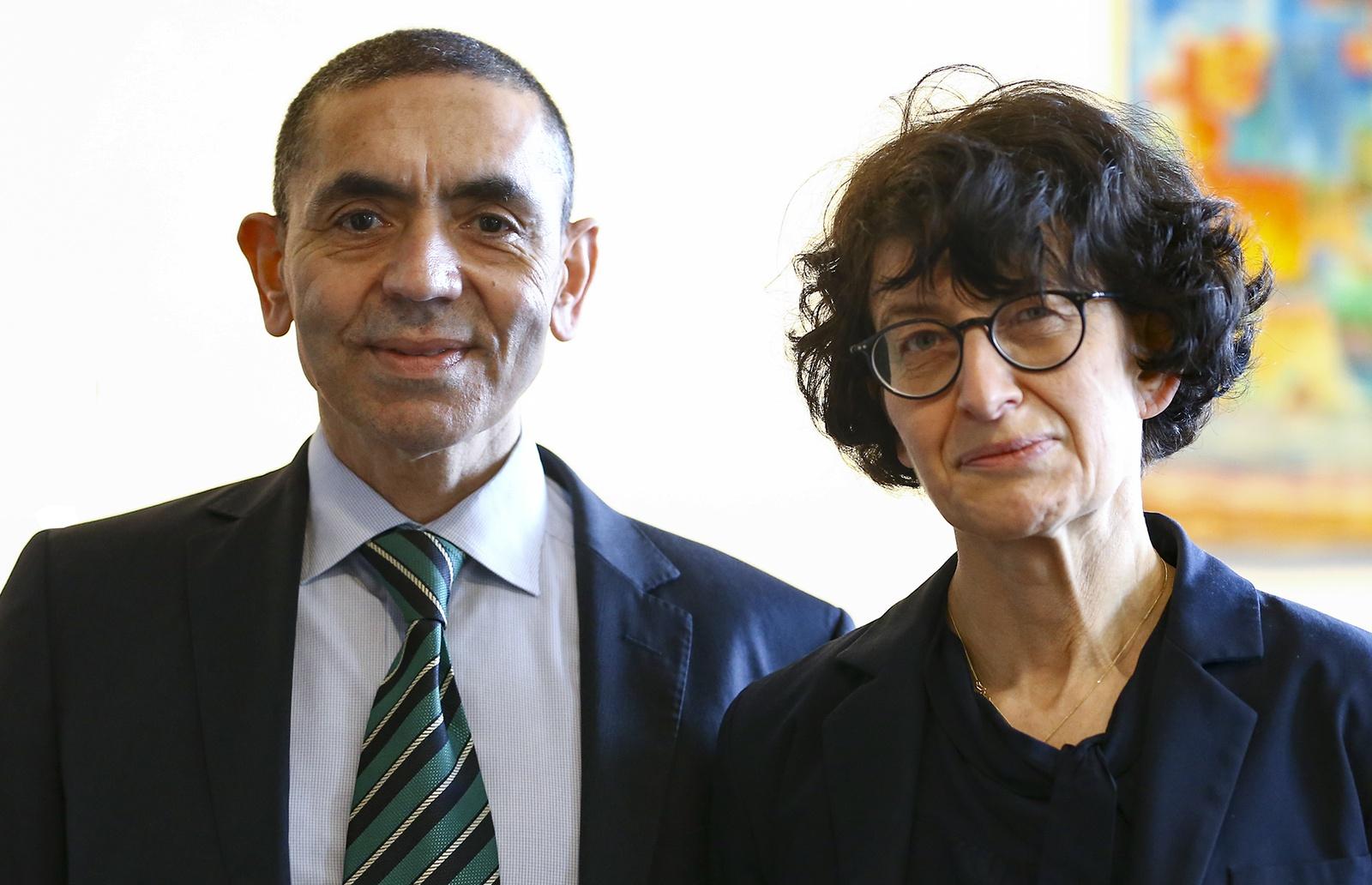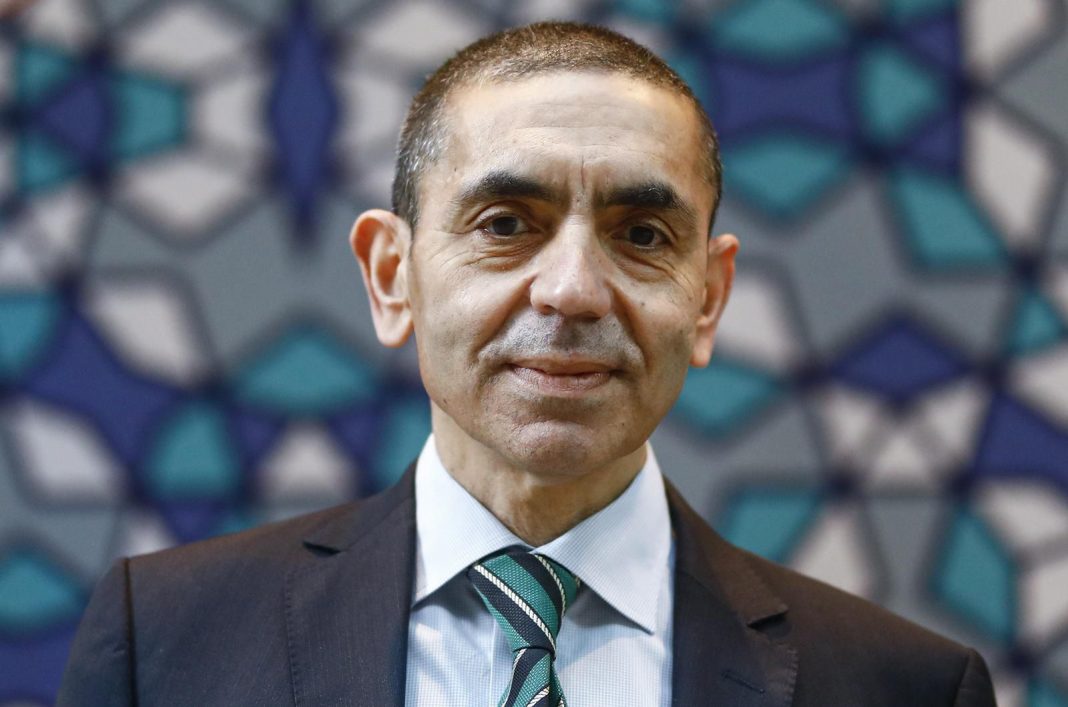
Uğur Şahin, cofounder and CEO of BioNTech
Uğur Şahin is a scientist at heart: the cofounder and CEO of BioNTech would rather be in the lab than almost anywhere else. On the day he married his wife, fellow BioNTech cofounder Özlem Türeci, the two went back to work after the nuptials. (Türeci is BioNTech’s chief medical officer.)
The mild-mannered Turkish immigrant, who moved to Germany with his parents at age 4, has more the vibe of a college professor than the high-powered CEO of a $27 billion market cap company. In fact he is a professor — he has been one at the University of Mainz for more than 20 years. He still bikes to work everyday from his apartment in Mainz because he and his wife don’t own a car, and he can still often be found in his company’s laboratories. But his company’s partnership with Pfizer has turned BioNTech into one of the most important biotechs in the world, thanks to the co-development of the first authorized vaccine against Covid-19. That success has made Şahin a billionaire, as well, with a net worth of $4.8 billion.
The company, whose vaccine has already been administered to millions, estimates that it can manufacture 2.5 billion doses of the vaccine by the end of this year — enough to protect more than 15% of the world from the deadly disease. All of this has accelerated the growth of the biotech company. It now has more than 1,900 employees over two continents, 600 of whom have been hired since 2019; revenues, meanwhile, increased nearly 350% in 2020 compared to the previous year. Its projected revenues from Covid-19 vaccines in 2021 is $11.5 billion.
The triumph of the Covid-19 vaccine, Şahin says, is “motivating us to use the success to further accelerate our other programs.”
Here’s what this scientist CEO is dreaming up next:
Covid Vaccines 2.0
The BioNTech-Pfizer Covid-19 vaccine has been administered to more than 200 million people in over 65 countries — but the companies plan to keep tweaking and testing the vaccine. Though the end of the pandemic may be in sight, the growing number of Covid-19 variants is a major obstacle to that goal. Some of these variants have already been shown to be more contagious, more deadly, and less impacted by vaccines. While the BioNTech vaccine is effective against the B.1.1.7 variant that was first discovered in the U.K., it may not be as potent against the B.1.351 variant that is now dominating South Africa. In its annual report, BioNTech said that it plans to do clinical trials to test its vaccine against different variants, and it may develop new versions of its vaccine that are more specific to them. The company is also looking at whether or not a third booster shot 6-12 months after the second dose of the vaccine can increase immunity. “We already know that our vaccine is preventing hospitalization and preventing death in people,” Şahin says, “this is of course a wonderful, wonderful accomplishment.”
Right now the vaccine is only authorized in the U.S. and other countries for people ages 16 and up, but a recent study showed that the vaccine is 100% effective at preventing disease in adolescents ages 12-15 years old. A study in even younger children is still ongoing.
The scientists also plan to test more stable formulas of the currently fragile mRNA vaccine that needs to be stored at low temperatures. In addition to developing new, more robust versions of the vaccine, they are also looking at a unique way of transporting it: by freeze-drying it. If successful, this could mean expanding the rollout of the BioNTech-Pfizer vaccine to low-income countries with less infrastructure.
Fighting HIV And Tuberculosis
Covid-19 isn’t the only virus that BioNTech is battling. In 2019, BioNTech announced a $55 million partnership with the Bill and Melinda Gates Foundation to develop new treatments for HIV and tuberculosis. The HIV vaccine currently involves using mRNA to prime T cells within the body to fight the virus if it is encountered. So far, these treatments are still in preclinical stages.

Uğur Şahin and Özlem Türeci cofounded BioNTech in 2008.
New Vaccines To Treat Cancer
BioNTech isn’t Şahin’s first biotech company. That was Ganymed Pharmaceuticals, which he cofounded with Türeci to develop new cancer treatments. The company was sold to Japanese pharma company Astellas in 2016 for $1.4 billion. But Şahin’s experience with cancer patients as an oncologist kept him motivated to find better cancer treatments. Before the pandemic, BioNTech’s research was focused on how the immune system interacts with cancer. When he first began cancer research, Şahin said, “a key question for us was why so many cancer treatments are failing, and what is the root cause?”
One of the company’s most advanced products is a personalized cancer vaccine. It is developed using cancer tissue samples from a patient, identifying the distinct genetic markers in that cancer, and using mRNA to stimulate the patient’s immune response into attacking those markets. In essence: mRNA trains your own immune system to kill the specific cancer in your body.
Şahin says that the company is currently in phase 2 clinical trials with two of its cancer-fighting vaccines. “There might be a significant likelihood that we get our first cancer mRNA products into submitting for approval in 2023 or 2024,” he says.
A Combo Approach: Gene Therapy and mRNA
In addition to developing new treatments, Şahin’s company is also exploring ways to boost the effectiveness of cancer medications that are currently on the market. One of these is CAR-T cell therapy, which provides another way to train a patient’s immune system to attack cancer. But it’s not always successful, for reasons still unknown. To make it more effective, BioNTech is developing an mRNA booster that can be used in combination with CAR-T cell therapy to produce more modified T cells within the body that are on the lookout for more specific cancer targets. One major advantage of this is that it has the potential to treat types of cancer that are difficult to attack with CAR-T therapy by itself. “We are opening the door for the first combination therapies of a gene therapy and an mRNA,” Şahin says. “This is a completely new approach.”
Some of these new mRNA treatments are years away — but in the meantime, business is still thriving and the company continues to ink deals with pharma giants including Genentech and Sanofi. As for Şahin, like a true scientist, what he’s looking forward to is the data that emerges over the next few months to guide his company’s future. “The next two years will be extremely informative,” he says.









